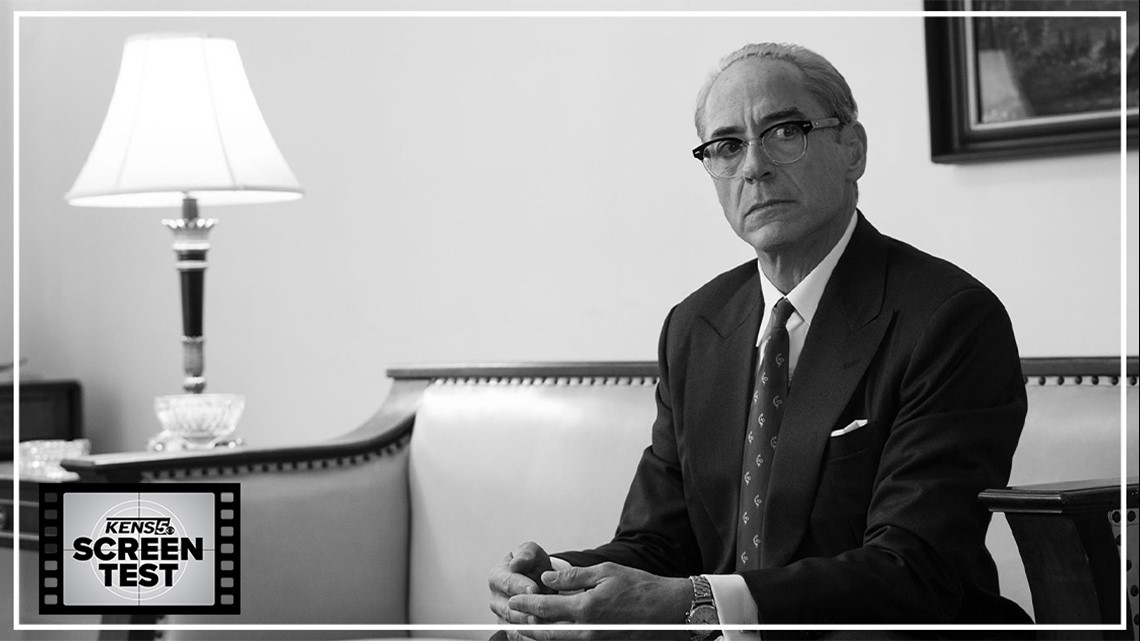TEXAS, USA — It’s telling that Christopher Nolan’s “Oppenheimer” – a mammoth drama that zips through montages of men talking in congressional chambers, scientific labs, and New Mexico deserts where history will eventually come alive with blinding light and a gut-level reaction like few directors can achieve on this scale – ends suddenly. What we’re left with is a note of mystery over whether we’ve really seen it all.
It could be because the political power games that stuffed and sometimes stifled the events of the previous three hours are finally revealed as what they were: Petty Washington squabbling failing to take full stock of the godly power that’s been delivered by the movie’s eponymous physicist until doom dawns behind the globe-sized eyes of the actor playing him. For as much as Nolan’s epics traffic in mind-melting rules (at least until shattering them with an IMAX-screen-sized mallet) the British filmmaker also loves leaving us with a tinge of cosmic ambiguity. And Cillian Murphy – playing J. Robert Oppenheimer, the father of the atomic bomb, in a rare and welcome leading part – comes equipped with a gaze able to channel that ambiguity with startling clarity.
It could also be that “Oppenheimer” simply hasn’t earned the moment. Ever since “Inception,” every new Nolan film has felt like a summation of what he’s been building up to; his movies may be cold, but coldness is the natural destination for his characters once they’ve been humbled by their own sheer brilliance. Bruce Wayne and Alfred Borden and Dom Cobb eventually come face to face with the worlds of their own making—as does J. Robert Oppenheimer, among the most brilliant of Nolan protagonists, if the slow-onset psychological devastation we come to witness is any indication. Yet at times in this 180-minute saga, it can seem like Nolan – working from Kai Bird and Martin Sherwin’s Pulitzer-winning biography "American Prometheus" – obfuscates the full depths of his subject’s burden, undercutting the very subjectivity that sets the movie’s best sequences ablaze with the consequences of ostensibly heroic actions. “Theory can only take you so far,” Oppenheimer says at one point. Indeed.
Oppenheimer was a physicist but “Oppenheimer” is as sturdy a feat of cinematic engineering as any of Nolan’s prior efforts. Nolan approaches his stories like Rubik’s cubes, which here means we’re kept on our toes so as not to stumble under the constantly shifting tectonic plates of his script. The movie opens several years after the bomb has been dropped in 1945, foregrounding the political rivalry that blossomed between former associates Oppenheimer and Lewis Strauss (Robert Downey Jr.) in the ‘50s. Mired in separate uphill battles whose atoms nonetheless jump to each others’ orbits – the scientist trying to retain national security clearance amid accusations of once-upon-a-time Communist activity, the politician trying to be confirmed for a cabinet position – this latter timeline serves as the arena in which J. Robert Oppenheimer’s experiences will be recalled and recounted, and in exacting, sometimes challenging detail. You can understand why: The McCarthyism of the 1950s made no concessions for the privacy of its targets.
The shifting proximities of timelines and motivations in “Oppenheimer” – most of it presented in color, some of the latter-chronology scenes in black-and-white – unfold with thrilling rhythm, tightly weaving the dense tapestry of people and places key to Oppenheimer’s burgeoning role in the war and world to come. These include his time learning in Europe as a promising young talent, an eventual arrival in Berkeley and his interests in radical methods to solve the world’s issues, much to the chagrin of school administration. Eventually he’s recruited into a secret military project whose objective Oppenheimer is smart enough to infer simply by paying attention: The Germans are turning to science to build a massive new weapon, and the Americans surely are off to their own pursuit.
The directive set forth in Nolan’s last film, “Tenet,” was that its confusing backwards-is-forwards-is-backwards chalkboard logic didn’t matter so long as you surrender to the sensory thrills of watching it in practice. “Oppenheimer” is a much better film than that one, but we’re expected to play by different rules: That is, you’d better pay attention. For as much as “Oppenheimer” showcases the director’s knack for harmonizing music, image and sound into engrossing cinema, the movie’s momentum has a way of cobbling storytelling intentions back together just as they’re on the verge of crumbling. A moment arrives when, before heading to Los Alamos to direct the Manhattan Project, Oppenheimer’s wife, Kitty (Emily Blunt), declares, “Everything’s changing.” We know what she means in practical terms. But at certain junctures in the story we can hardly appreciate what’s to come when the sights of where we just were were fleeting.
This kind of narrative propulsion isn’t new for Nolan, who over the years has made a convincing thematic case out of the disorientation his movies sometimes afflict us with. And yet, the film’s speed – necessary to crunch decades of history into a condensed character study – is a bit like a trick in itself, both neglecting to let us dwell in a moment while emphasizing that Oppenheimer himself rarely did. He was a careful and calculating scientist in the eyes of his colleagues, while at home he cheated on Kitty and struggled with mental torment as a young man. He was attracted to a challenge, but we come to wonder if this wasn’t out of self-preservation. He understood the importance of strategy, but he was also impulsive.
The showcasing of these contradictions play out in the movie’s first hour like necessary legwork, the elements and components of an equation being carefully applied before a result to be divulged much later in the film reveals the truth behind what Oppenheimer is remembering. And also how this is all being remembered: Occasionally “Oppenheimer” will sprinkle in an astounding few frames of atoms suspended in space, of fleeting apocalyptic imagery, of particles spinning so fast they resemble a film reel. It’s apparent this is more than just a way to get us cinematically invested in the science beyond terminology the average moviegoer won’t understand—it could very well be that, in Nolan’s estimation, Robert clung to the inexplicable in order to make sense of what was in front of him, on newspapers and the tired faces of lovers who continue to haunt him. What’s clear is that “Oppenheimer” acknowledges a moral complexity that its subject willfully, desperately blinded himself to.
Nowhere is this more apparent than the movie’s faces, and you’ll recognize a great many in the sprawling cast of “Oppenheimer.” The filmmaker has on occasion created moviegoing experiences worthy of the term “magical,” yet it’s hard to think of a bigger trick he’ll pulled off than revealing that the most consistently deployed spectacle of “Oppenheimer,” one of the biggest post-COVID movie events, lies in the crevices and frowns and reactions of his performers. Among the carousel are Oscar winners with just a handful of lines (Rami Malek, Gary Oldman, Casey Affleck) and actors we haven’t seen enlisted for such gravely material in some time (Josh Hartnett, Downey Jr., Kenneth Branagh). There is the dadcore energy of Matt Damon, playing Los Alamo’s military leader opposite Murphy’s scientific one, and the intensity of Blunt, who is able to spin her character's one-dimensionality into a wrenching initial sign that Oppenheimer must and will confront himself.
And there’s Murphy himself, whose few opportunities in major leading roles over the years feels like the result of Hollywood not quite knowing how to approach the mysterious energy emanating from the canyons of his jawline, the alluring blue of his eyes that can turn from villainous to boyish to supremely melancholic in an instant. He is a magnetic central force as J. Robert Oppenheimer, his internal tug-of-war between fighting for the present and despairing for the future asserting itself even in moments that feel most like straightforward presentation of history. That he remains the anchor amid a cast as wide as one of the film's vistas as captured by cinematographer Hoyte Van Hoytema speaks to Nolan’s own triumph, as well as to the frustrations that can spring when dialogue is delivered in such a way that advances story while leaving mood simmering at too low a frequency.


It’s telling that Nolan pumps the brakes on his timeline-ricocheting for the showstopper sequence of the Manhattan’s Project’s explosive exam in New Mexico. Ludwig Göransson’s mighty score lends us a hand throughout the film by establishing the tone and tenor, but there isn’t a stronger auditory cue than the sound of a crackling Geiger Counter accompanying our first glimpse at the construction of Oppie’s “gadget,” a gripping buildup where talk of science and potential treason gives way to prolonged anticipation and, eventually, one of the most spectacularly horrifying – or is that horrifyingly spectacular? – images in recent American cinema. Once the various players on screen start scrambling and the intimidating image of an isolated derrick in the desert asserts itself, you begin to sit a little straighter. This is all to say you may occasionally forget the events of “Oppenheimer” revolve around security clearances and bombs, an impressive recalculation that underscores the complicated endeavor Nolan has set forth for himself: How does one recount an incredible historical event whose implications could only truly be appreciated in hindsight, once the flash of scientific triumph gave way to the aftermath of destructive power?
Nolan, for his part, is as forthright on the matter as his subject is devastated by it. I would advise you, dear reader, to pay close attention to a moment of self-confrontation that will test movie theaters’ sound systems to an even more deafening degree than the bomb itself… only I don’t have to, because there’s no missing it, and not in the least because the scene in question is the closest Nolan has ever come to outright horror while also accentuating the identity crisis faced by “Oppenheimer” (and Oppenheimer). On the one hand, the sequence in question shows Nolan reaching for the dizzying peak of his powers, the same mountaintop occupied by dreamscapes collapsing in on themselves and a prince of crime wreaking havoc. On the other, it puts into stark relief the comparative cruise-control of the movie’s looming final third, when Nolan struggles to keep the sting of moral bankruptcy alive amid streams of cross-cutting conversation threatening to submerge feelings of dread or poignancy entirely.
Perhaps this is how the movie was always going to feel, and should feel as a way of replicating the collision between brilliance and self-confrontation that few figures in history navigated on so stunning a scale as J. Robert Oppenhimer. As with most Nolan films, his latest will benefit from multiple viewings where timelines and ideas will surely click more tightly into place. But I also think he's aiming for audiences to pick their own way through the disorientation they’re likely to feel after their first screening; the swirling sense of confusion and anxiety you can make out through the toll of history but can’t quite shake off. Perhaps the reason we feel we haven't quite seen all we should by the end of "Oppenheimer" is because we're living it to this day.
"Oppenheimer" is now in theaters. It's rated R for some sexuality, nudity and language. Runtime: 3 hours.
Starring Cillian Murphy, Emily Blunt, Matt Damon, Robert Downey Jr.
Directed by Christopher Nolan; written by Nolan, adapting the book "American Prometheus" by Kai Bird and Martin Sherwin
2023
---
>MORE REVIEWS:



